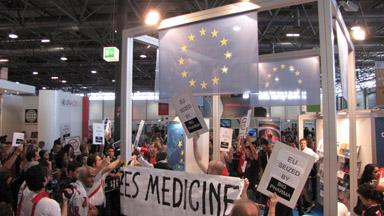IPA concerned over PMO’s efforts to destabilize India’s IPR regime at the behest of EU

PharmaBiz | Thursday, January 27, 2011
IPA concerned over PMO’s efforts to destabilize India’s IPR regime at the behest of EU
Ramesh Shankar, Mumbai
The Indian Pharmaceutical Alliance (IPA), an association of leading Indian pharma companies, has raised alarm over the recent media reports that efforts are going on in the Prime Ministers Office (PMO) to destabilize India’s IPR regime at the behest of European Union which, the IPA cautioned the government, will have serious implications on the public health, access to medicines and the domestic generic industry.
Asking the government to seriously examine its implications on the public health, access to medicines and the domestic generic industry, IPA secretary general D G Shah, in a letter to union minister of chemicals & fertilizers MK Alagiri, said that the reported move by the PMO will not only overturn India’s IPR regime, but will also reverse judgments by the Supreme Court on issues relating to patentability [Sec 3(d) of the Patents Act], data exclusivity and patent linkage.
The reported move will also have serious repercussions on India’s leadership role of G-77 both in the WTO and the WIPO. The whole developing world supported India in the TRIPS negotiations leading to Doha Declaration on the TRIPS Agreement and Public Health. Now, if India were to surrender these flexibilities and succumb to the EU pressure, they will perceive the move as let down by India as they will be deprived of affordable quality medicines, the IPA letter said.
There were media reports that the PMO, under pressure from the hard lobbying by the EU which is engaged in the proposed EU-India Free Trade Agreement (FTA), is putting pressure on the reluctant union commerce and industry ministry to include a contentious IPR chapter in the proposed FTA. The EU wants India to liberalise its patenting standards exclusively for the applicants from the EU’s 27 countries.
Besides the IPA, the proposed EU-India Free Trade Agreement (FTA) has caused considerable concern among the civil society organizations and others because of apprehensions about its impact on access to medicines. More so, as the impact will not be restricted to India alone but will also extend to developing countries as India is a major source of affordable generic medicines.





